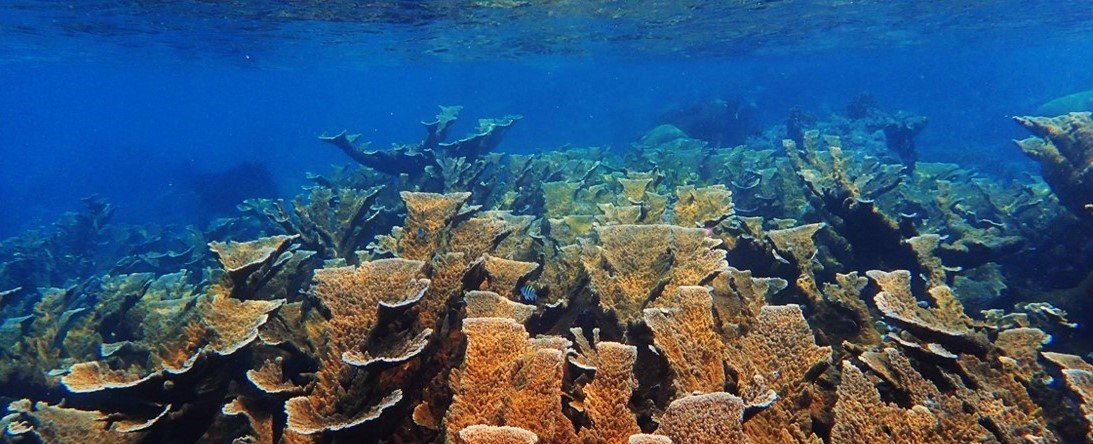Mesoamerican Reef Report Card – 2024

Photo: Henry Brown
On October 29, Healthy Reefs for Healthy People launched the 2024 Mesoamerican Reef Report Card, a crucial assessment presented simultaneously in Mexico, Belize, Guatemala, and Honduras. This year, it was also showcased at COP16 in Colombia.
In Guatemala, a main panel was formed to highlight the importance of actions and compliance with public policy. The vital role of territorial technical tables was emphasized to enhance collaboration among public organizations, NGOs, the private sector, the community, and women’s leadership, as well as the valuable contribution of academia in generating data and fostering joint efforts.
Significant improvements have been made in some indicators, but we also face considerable challenges in advancing our shared mission.
Press Release:
A Glimmer of Good News from the Mesoamerican Reef as reef health improved for the first time in five years, although the overall grade remains “poor”
The 2024 Mesoamerican Reef Report Card was released today by Healthy Reefs for Healthy People (HRHP), in collaboration with over 70 organizations dedicated to the conservation of the Mesoamerican Reef (MAR) in Mexico, Belize, Guatemala, and Honduras that collectively form the Healthy Reefs Initiative (HRI). This regional initiative provides robust, useful data and promotes partnerships that enable ecosystem-based management and adaptive conservation of the Mesoamerican Reef. For this Report Card, we had a total of 99 data collectors from 41 organizations dedicated to AGRRA monitoring. Since 2008, these Reef Health Report Cards have tracked indicators of reef health over time: live coral cover, fleshy macroalgae cover, and the biomass of key herbivorous and commercial fish species. The collaborative monitoring uses standardized methods and data from hundreds of sites to provide a comprehensive analysis. Reef health can be assessed for each indicator or for the integrated Reef Health Index, which equally considers all four indicators. Evaluations can be conducted at the site, subregion, country, or full Mesoamerican Reef scale.
The findings of the 2024 report offer a mix of hope and urgency. Despite some improvements, the overall health of the reef system is fragile and facing increasing threats. The health of the Mesoamerican Reef remains a concern, with most of the 286 monitored sites categorized as either in poor (39%) or critical (23%) condition. However, sites in fair and good condition have improved, rising from 20% to 28% and 5% to 9%, respectively. More of the 18 subregions saw improvements than declines, yet none are now classified as being in good condition, and two are considered critical.
Key Findings:
● Coral Health: Coral health has been severely impacted by disease outbreaks and bleaching, reducing coral cover from 19% to 17%. Alarmingly, mortality continued even after surveys concluded. The 2023 bleaching event was the most severe on record, with approximately 40% of corals severely affected, and significant mortality observed at several iconic reef sites.
● Fish Populations: On a positive note, commercial fish biomass increased by 40%, largely due to stronger enforcement measures. Herbivorous fish biomass also saw a 30% rise, though it’s worth noting that 9 out of 10 parrotfish remain under 30cm, and species with higher herbivory potential are still uncommon. The population of larger fish species, such as snappers and groupers, remains concerning, with 67% of snappers and 78% of groupers being immature. This emphasizes the need for more fisheries regulations and community-led fishery management initiatives to allow commercial species to reach maturity and replenish stocks.
● Management: The statistics for Marine Protected Areas (MPAs) have shown little change, particularly regarding the percentage under Full Protection. However, stronger enforcement appears to have led to higher fish biomass within Fully Protected and Highly Protected Zones. To further protect marine ecosystems, it is crucial to establish science-based limits on size, catch, and fishing efforts, while also achieving the goal of designating 20% of the sea as Fully Protected Zones. The active involvement of fishers in fisheries management, alongside transitional economic support and training, is essential to achieving these objectives.
● Water Quality Concerns: High nutrient levels, particularly in the southern region, and unacceptable concentrations of human sewage pathogens continue to jeopardize reef health. Both government and private sector investments are needed to implement tertiary wastewater treatment with effective management systems and to enforce national regulations aligned with the Cartagena Convention’s water quality standards. Defining tourism carrying capacities in coastal zones is necessary, and the Mesoamerican Reef should be declared a Particularly Sensitive Sea Area (PSSA) to ensure its long-term protection.
Dr. Melanie McField, Director of HRHP, expresses the need for immediate intervention: “The Mesoamerican Reef is at a critical juncture. While we celebrate any increase in fish populations and improved enforcement of MPAs, we must acknowledge and address the more challenging root causes of coral decline. Pollution (including greenhouse gases), coastal development, and unsustainable fishing levels are eroding the ecological processes that maintain biodiversity and reef functioning. It’s not just a conservation issue; it’s a matter of securing the livelihoods, food security, and natural coastal protection of millions of people who depend on the Mesoamerican Reef.”
At the national level, Quintana Roo, Mexico, faces reefs now dominated by fleshy macroalgae (20%), turf algae (30%), and increasing cyanobacteria (5%) due to rising temperatures and declining water quality. The scarcity of large fish, critical for reproduction, replenishment, and effective grazing, is alarming. With the continuous rise of large-scale development projects, Quintana Roo’s marine ecosystems are under immense pressure and stress. MSc Mélina Soto, HRHP Mexico coordinator, highlights that: “Cozumel’s decline, the most severe in the entire region, from ‘Good’ to ‘Fair,’ is a stark reminder of the challenges faced by Quintana Roo’s coral reefs. Despite some gains in fish biomass, coral cover remains critically low, and increasing macroalgae and cyanobacteria threaten our reefs’ resilience. Coordinated management and restoration efforts are urgently needed to protect these ecosystems.”
In Belize, increased enforcement efforts have led to a greater presence of patrols and a stronger deterrent against illegal activities. Enforcement is just one of five critical pillars needed to achieve sustainability, alongside compliance, political will, education, and funding. With public support and proper management, these measures can build the foundation for resilience, with a goal of protecting 30% of ocean space by 2030, supported by sustained funding. MSc Raphael Martinez, HRHP Belize Coordinator, highlights that: “Over the last eight years, Belize’s Reef Health Index has fluctuated between ‘fair’ (pre-COVID) and ‘poor’ (post-COVID pandemic). Currently, with a score of 2.5 out of 5, it remains in the ‘poor’ category, but it is trending in the right direction. Notably, we’ve seen increases in herbivorous fish biomass and commercial fish biomass. However, anthropogenic and climate change-related impacts, such as pollution and warming seas, continue to contribute to the decline in coral cover and the increased threat of macroalgae proliferation. To address these challenges, it is critical that we coordinate efforts across sectors to improve reef health and ensure the long-term sustainability of Belize’s reef ecosystem.”
Guatemala’s Reef Health Index has improved the most from 1.8 to 2.3 (out of 5), primarily due to its maintained ‘good’ coral cover, an increase in herbivorous fish, and a reduction in macroalgae, though the reef remains in “poor” condition overall. Unsustainable fishing contributes to the continued “critical” state of commercial fish biomass, despite coral cover being in “good” condition. MSc Ana Giró, HRHP Guatemalan Coordinator, highlights that: “Guatemala has seen an increase in herbivorous fish biomass and a reduction in macroalgae cover. However, to sustain this progress and further enhance reef health, there is an urgent need to address water quality through better sewage, sanitation, and agricultural runoff management. By enforcing fishing regulations and protecting key reefs like the Cayman Crown, we can rebuild fish populations and continue supporting both biodiversity and local fisheries.”
In Honduras, significant progress has been made in coral reef conservation through the collaboration of multiple sectors, but more political action is required to safeguard highly vulnerable marine protected areas, such as the Swan Islands and Miskito Cays. These areas not only face environmental threats but also affect the livelihoods of surrounding communities. Nationally, coral cover has decreased by 3%, likely due to extensive bleaching events. Meanwhile, the consumption of commercial fish requires monitoring, especially after the reopening of tourism, and better wastewater and sanitation management is needed, despite a 2% decline in fleshy macroalgae nationally. “After the devastating bleaching event of 2023, Cordelia Banks—one of the most iconic reefs in Honduras and the Caribbean—saw its live coral cover plummet from 46% to just 5% by early 2024. Across the country, other reefs such as Tela Bay faced a similar fate. Now, more than ever, it is time for governments, local communities, the private sector, and researchers to strengthen ties and increase efforts to restore and preserve what remains. The health of our reefs and other marine ecosystems mirrors the state of our forests; they are deeply interconnected,” shared Biol. Claudia Guerrero, HRHP Honduras Coordinator.
Industrial nations need to invest more in solutions that can rectify the causes of global climate change, or reef-dependent nations may need to consider legal claims for their resulting losses. At the same time, these reef-stewarding nations need to implement long-standing management recommendations, including achieving full protection of 20% of their reefs, increasing investments in sewage treatment and pollution reduction, and preventing massive coastal developments that cause irreparable harm to nature and misaligned economic benefits. Dr. McField concludes: “As the leaders of these four countries acknowledged in their 1997 Tulum Declaration, the Mesoamerican Reef is both a shared resource and a shared responsibility. We must work together to protect it, but also work with an urgency befitting the escalating and accumulating threats to the very existence of coral reefs”. We appeal to policymakers, coastal communities, donors, and global citizens everywhere to take actions NOW that make peace with Nature—especially our amazing coral reefs.
Tags: Healthy Reefs for Healthy People, MAR Fund



